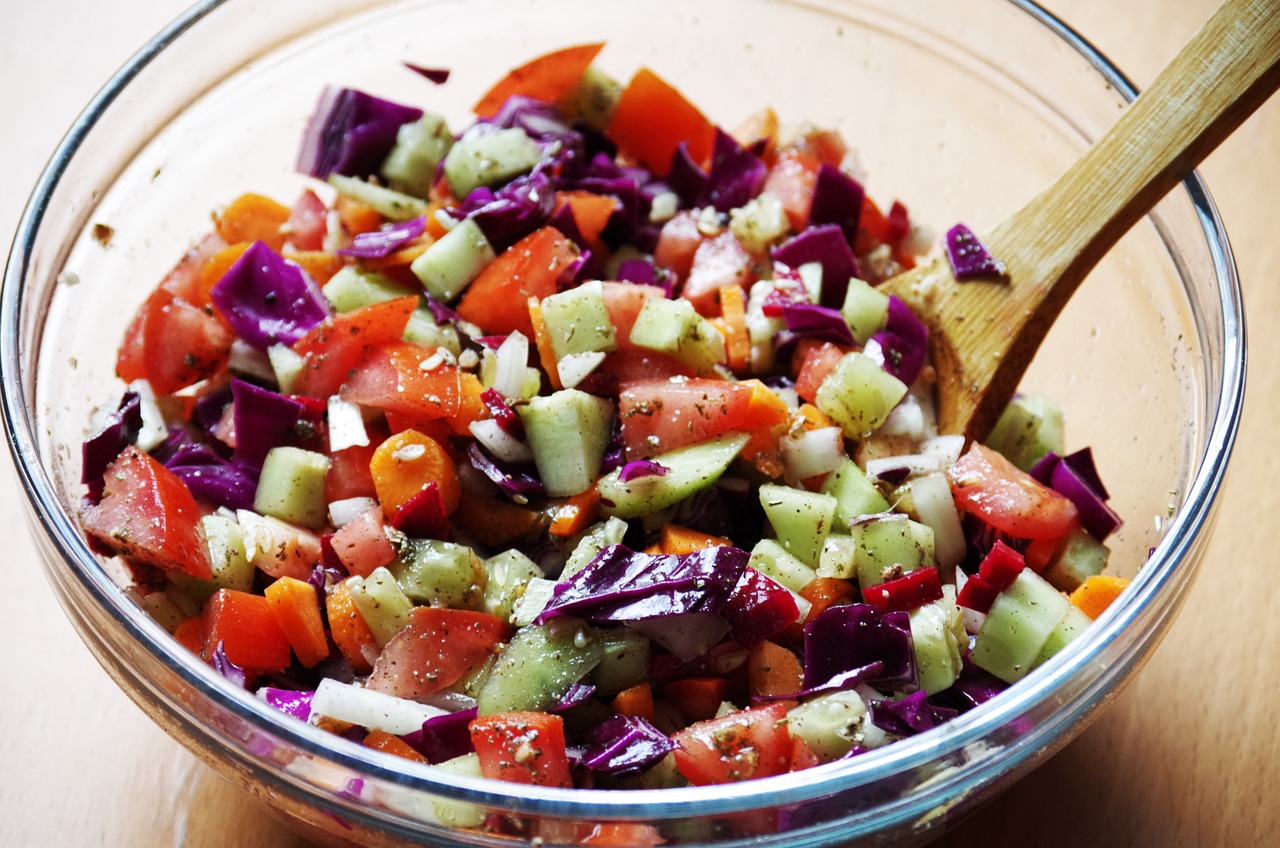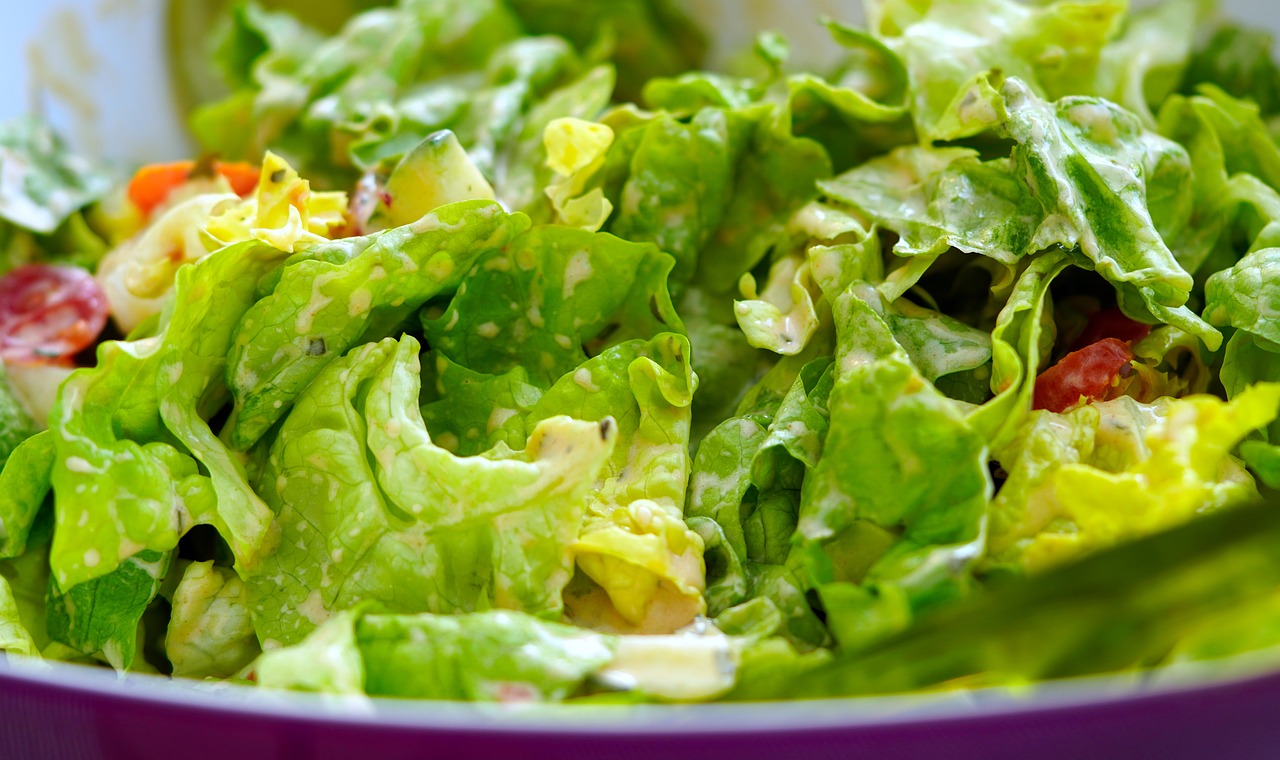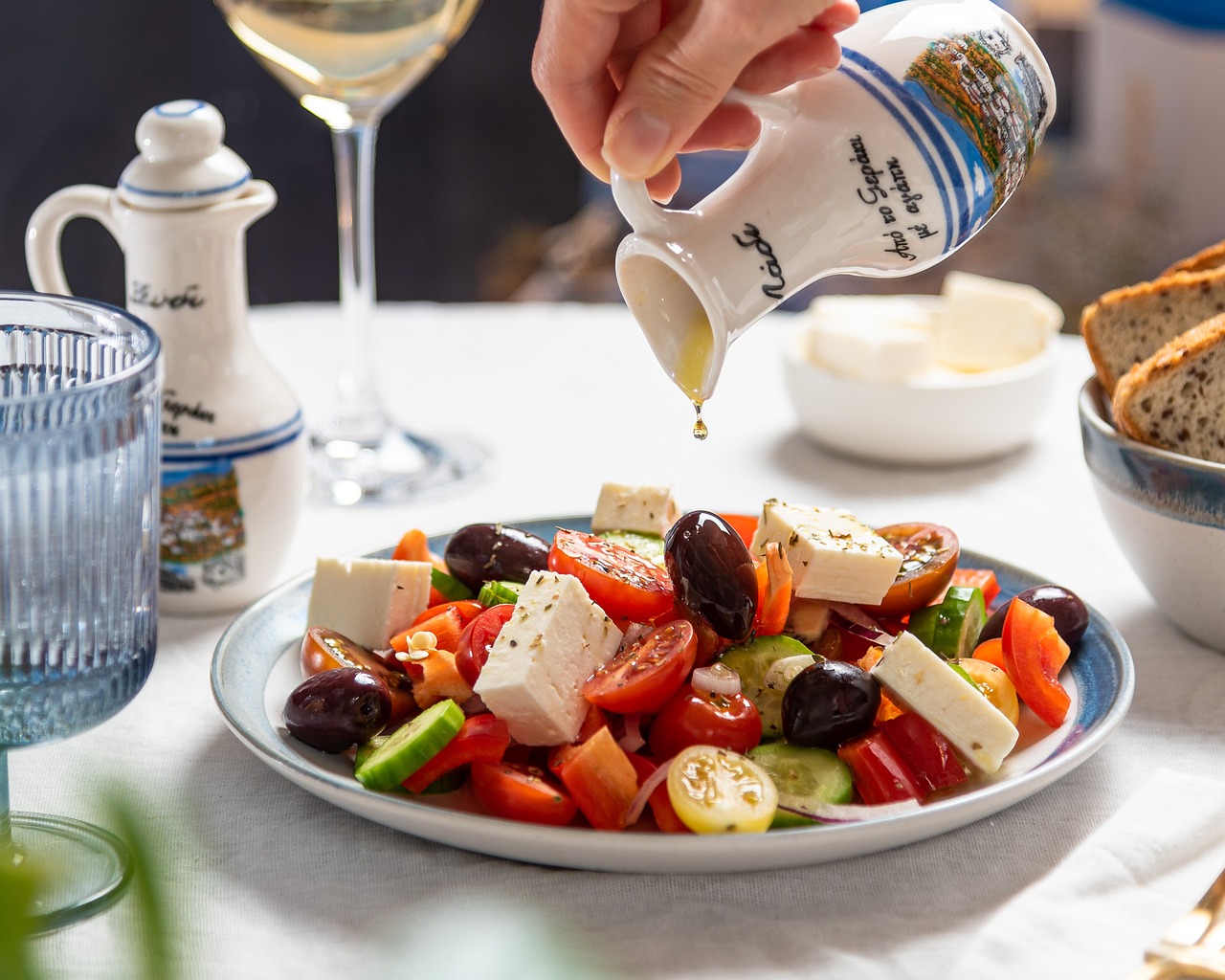The Ultimate Guide to Greek Greek Salad
Greek salad, a delightful and iconic dish, encapsulates the vibrant flavors and fresh ingredients of Mediterranean cuisine. Originating from Greece, this salad has become a beloved classic worldwide, offering a harmonious blend of textures and tastes that tantalize the taste buds.

History of Greek Salad
The history of Greek salad is a tale as old as time, dating back to ancient Greece where simple yet flavorful ingredients were combined to create a dish that would stand the test of time. The origins of Greek salad can be traced back to the rural villages of Greece, where farmers and shepherds would gather fresh produce and dairy products to create a satisfying and nutritious meal.
Originally known as "horiatiki" or village salad, the traditional Greek salad was a humble mix of tomatoes, cucumbers, onions, olives, and feta cheese, drizzled with olive oil and sprinkled with herbs. This simple yet delicious combination captured the essence of Mediterranean cuisine, showcasing the bounty of the land and the simplicity of Greek cooking.
Over the centuries, Greek salad has evolved and adapted to changing culinary trends and tastes. With the introduction of new ingredients and flavors, the classic recipe has been enhanced and modified to suit modern palates while still staying true to its roots. Today, Greek salad is not only a staple in Greek households but has also gained popularity worldwide as a refreshing and healthy dish.
The cultural significance of Greek salad lies in its ability to bring people together, whether at a family dinner table or a bustling taverna overlooking the Mediterranean Sea. It embodies the spirit of sharing and conviviality, offering a taste of Greece's rich culinary heritage to all who partake in its vibrant flavors.

Key Ingredients
When it comes to crafting the perfect Greek salad, the key ingredients play a vital role in creating that authentic Mediterranean flavor explosion. Each component contributes its own unique taste and texture, coming together to form a harmonious dish that is both refreshing and satisfying.
At the heart of a traditional Greek salad are ripe tomatoes, bursting with juicy sweetness that contrasts beautifully with the salty tang of feta cheese. The crisp freshness of cucumbers adds a refreshing crunch, while Kalamata olives bring a briny richness to the mix. Fragrant herbs like oregano and parsley provide a burst of aromatic flavor that ties everything together.
Let's not forget the star of the show - feta cheese. This creamy and tangy cheese made from sheep's milk adds a luxurious creaminess to the salad, elevating it to a whole new level. The combination of these key ingredients creates a symphony of flavors that dance on your taste buds with each bite.
To enhance the visual appeal and nutritional value of the salad, red onions are often added for a hint of sharpness and vibrant color. A drizzle of extra virgin olive oil and a squeeze of fresh lemon juice bring a bright acidity that ties all the flavors together in perfect harmony.
While the classic Greek salad sticks to these essential ingredients, there is room for creativity and personalization. Some variations may include bell peppers, capers, or even avocado for a modern twist on the traditional recipe. The beauty of Greek salad lies in its versatility, allowing you to tailor it to your taste preferences while staying true to its Mediterranean roots.

Variations and Regional Twists
When it comes to Greek salad, there are countless variations and regional twists that showcase the diverse culinary landscape of Greece. From the bustling streets of Athens to the tranquil islands of the Aegean Sea, each region puts its own unique spin on this beloved dish, adding a touch of local flair and tradition.
One popular variation is the Village Greek Salad, also known as Horiatiki, which typically includes chunks of fresh vegetables like bell peppers and red onions, giving it a rustic and hearty appeal. This version often omits lettuce, focusing instead on the robust flavors of the vegetables and cheese.
On the island of Crete, you might encounter a unique twist with the addition of dakos, a traditional Cretan rusk made of barley, topped with juicy tomatoes, feta cheese, and a drizzle of olive oil. This variation adds a delightful crunch and earthy flavor to the classic Greek salad.
For a taste of the Aegean Sea, look out for Greek salads featuring fresh seafood such as grilled octopus or marinated anchovies. These maritime influences bring a briny and savory element to the dish, reflecting the seaside culture of the Greek islands.
Traveling to the Mainland, you might come across a Greek salad with a generous sprinkling of oregano and a splash of balsamic vinegar, offering a slightly sweeter and more aromatic profile. This version highlights the diverse agricultural produce found in the fertile valleys of mainland Greece.
Furthermore, modern interpretations of Greek salad have emerged in trendy restaurants and fusion kitchens, incorporating ingredients like quinoa, avocado, and kale to cater to contemporary palates. These innovative creations blend global flavors with the traditional essence of Greek salad, offering a fresh and exciting culinary experience.
Whether you prefer the classic recipe or enjoy exploring new variations, Greek salad continues to evolve and adapt to different tastes and preferences, making it a versatile and enduring dish in the world of Mediterranean cuisine.

Health Benefits
When it comes to the health benefits of Greek salad, it's not just about the delicious flavors but also the nourishing qualities that make it a wholesome choice. This iconic dish is a powerhouse of nutrients, offering a perfect blend of fresh ingredients that are not only tasty but also good for your well-being.
One of the key components of Greek salad is the abundance of vegetables like ripe tomatoes and crisp cucumbers. These veggies are rich in essential vitamins and minerals, providing a generous dose of antioxidants that help boost your immune system and promote overall health.
Another star ingredient in Greek salad is feta cheese, which adds a creamy texture and tangy flavor. Despite being a dairy product, feta cheese is relatively low in calories compared to other cheeses, making it a lighter option that still delivers calcium and protein for strong bones and muscles.
Kalamata olives, a signature element of Greek salad, are not only a flavorful addition but also a source of healthy fats that are beneficial for heart health. These olives contain monounsaturated fats, which can help lower bad cholesterol levels and reduce the risk of cardiovascular diseases.
Herbs like oregano and mint, commonly used in Greek salad, not only enhance the taste but also offer medicinal properties. Oregano, for instance, is known for its antibacterial and anti-inflammatory effects, while mint aids in digestion and provides a refreshing touch to the dish.
Overall, the health benefits of Greek salad are undeniable, making it a smart choice for those looking to enjoy a delicious meal while nourishing their bodies with essential nutrients. Whether you're aiming to improve your immune system, support heart health, or simply indulge in a flavorful dish, Greek salad has you covered.

Serving Suggestions
When it comes to serving Greek salad, the options are as diverse as the flavors in the dish itself. This versatile dish can be enjoyed in various ways, making it suitable for any occasion. Here are some creative serving suggestions to elevate your Greek salad experience:
1. **Classic Side Dish:** Serve Greek salad as a refreshing side dish alongside grilled meats, seafood, or hearty main courses. The vibrant colors and fresh flavors of the salad complement a wide range of dishes, adding a Mediterranean touch to your meal.
2. **Main Course:** For a light and satisfying meal, turn your Greek salad into the star of the show by adding protein-rich ingredients such as grilled chicken, shrimp, or chickpeas. This hearty variation makes for a delicious and nutritious main course option.
3. **Appetizer Platter:** Create a mezze-style appetizer platter featuring Greek salad along with other Mediterranean favorites like hummus, tzatziki, stuffed grape leaves, and pita bread. This communal dining experience is perfect for sharing with friends and family.
4. **Picnic Essential:** Pack individual portions of Greek salad in mason jars or portable containers for a picnic in the park or a day at the beach. The convenient and colorful presentation makes it easy to enjoy this healthy dish on the go.
5. **Party Platter:** Arrange a large platter of Greek salad on a bed of fresh greens, garnished with extra feta cheese and olives for a stunning party centerpiece. This eye-catching display is sure to impress guests at any gathering.
Whether you prefer a traditional approach or enjoy experimenting with creative presentations, serving Greek salad offers endless possibilities to showcase this timeless Mediterranean dish in a new light.

Pairing Recommendations
When it comes to pairing Greek salad with other foods and beverages, there are several delicious options that can elevate your dining experience. The fresh and vibrant flavors of the salad make it a versatile dish that can complement a variety of dishes. For a classic pairing, consider serving Greek salad with grilled meats such as lamb or chicken. The savory and slightly charred notes of the grilled meat perfectly balance the crispness of the vegetables and the tanginess of the feta cheese.
If you prefer seafood, pairing Greek salad with grilled shrimp or fish is another excellent choice. The light and delicate flavors of the seafood enhance the Mediterranean essence of the salad, creating a harmonious combination that is both satisfying and refreshing. Additionally, the briny taste of Kalamata olives pairs exceptionally well with seafood, adding an extra layer of flavor to the dish.
For a vegetarian option, pairing Greek salad with a side of hummus and warm pita bread is a delightful way to enjoy a Mediterranean-inspired meal. The creamy texture of the hummus complements the crunchy vegetables in the salad, while the warm pita bread provides a comforting element to the dish. This combination is perfect for a light lunch or a healthy snack.
When it comes to beverages, Greek salad pairs well with a variety of drinks that enhance its flavors. A crisp and citrusy white wine, such as a Sauvignon Blanc or a Pinot Grigio, is an excellent choice to accompany the salad. The acidity of the wine cuts through the richness of the feta cheese and olives, while the citrus notes complement the freshness of the vegetables.
Alternatively, if you prefer non-alcoholic options, a glass of freshly squeezed lemonade or a refreshing iced tea can be a great pairing for Greek salad. The tartness of the lemonade or the herbal notes of the iced tea provide a palate-cleansing effect that enhances the overall dining experience. Whether you choose to enjoy your Greek salad with meat, seafood, or vegetarian options, there are plenty of pairing recommendations to suit your taste preferences and elevate your meal.

Culinary Tips and Tricks
When it comes to preparing the perfect Greek salad, attention to detail is key. Start by selecting the freshest and highest quality ingredients to ensure a vibrant and flavorful dish. Remember, the taste of your salad will greatly depend on the quality of the components you use, so opt for ripe tomatoes, crunchy cucumbers, and authentic Greek feta cheese for an authentic experience.
To enhance the overall taste profile of your Greek salad, consider marinating the ingredients in a mixture of extra virgin olive oil, lemon juice, oregano, and a pinch of salt before assembling the dish. This simple step allows the flavors to meld together, creating a harmonious and well-balanced taste sensation with each bite.
When it comes to cutting the vegetables for your Greek salad, aim for uniformity in size to ensure even distribution of flavors. Whether you prefer chunky or finely diced vegetables, consistency in cutting will not only enhance the visual appeal of your salad but also contribute to a satisfying texture in every mouthful.
Assembling a Greek salad is an art form in itself. Start by layering the tomatoes, cucumbers, onions, and olives in a large serving bowl, allowing the colors to create a visually appealing display. Crumble the feta cheese over the top and garnish with fresh herbs such as parsley or dill for a final touch of freshness.
When it comes to dressing your Greek salad, less is more. Drizzle a generous amount of extra virgin olive oil over the ingredients, followed by a splash of red wine vinegar for a tangy kick. Season with salt, pepper, and a sprinkle of dried oregano to elevate the flavors without overpowering the natural taste of the ingredients.
To add a creative twist to your Greek salad, consider incorporating additional ingredients such as grilled chicken, shrimp, or avocado for a protein boost or a touch of creaminess. Experiment with different types of olives, from green to black varieties, to introduce new flavors and textures to your salad creation.
Lastly, remember that the key to a memorable Greek salad lies in the balance of flavors and textures. Taste as you go and adjust the seasoning accordingly to achieve the perfect blend of sweet, tangy, salty, and savory elements. With these culinary tips and tricks, you'll be well on your way to mastering the art of preparing a delicious and authentic Greek salad.

Modern Twists and Fusion Creations
When it comes to the classic Greek salad, there's always room for innovation and creativity. Modern twists and fusion creations have taken this traditional dish to new heights, blending flavors and ingredients from around the world to deliver a unique culinary experience. Imagine the explosion of taste when global ingredients meet the Mediterranean charm of a Greek salad.
One popular modern twist is the addition of grilled chicken or shrimp to the traditional Greek salad, adding a protein punch and a smoky flavor that elevates the dish to a heartier meal. The juicy meat complements the freshness of the vegetables, creating a perfect balance of textures and tastes.
For those looking for a vegetarian option with a twist, roasted chickpeas or quinoa can be added to the salad, bringing a nutty crunch and extra protein to the mix. These additions not only enhance the nutritional value of the dish but also introduce new and exciting textures that play well with the traditional ingredients.
Another innovative fusion creation is the incorporation of Middle Eastern flavors, such as sumac, za'atar, or tahini dressing, into the Greek salad. These exotic spices and dressings add a depth of flavor and a hint of mystery to the dish, transporting your taste buds on a culinary journey across borders.
For a truly global fusion experience, some chefs have experimented with Asian-inspired ingredients like sesame ginger dressing, crispy wonton strips, or pickled ginger in their Greek salad. The result is a harmonious blend of Eastern and Western flavors that surprises and delights with every bite, offering a fresh perspective on a Mediterranean classic.
Whether you prefer a traditional Greek salad or are eager to explore modern twists and fusion creations, there is no shortage of culinary inspiration to satisfy your taste buds. Embrace the unexpected, let your creativity soar, and enjoy the explosion of flavors that come with reinventing a timeless dish.
Frequently Asked Questions
- What is the origin of Greek salad?
Greek salad, also known as "Horiatiki," originates from Greece and has been a staple in Mediterranean cuisine for centuries. Its roots can be traced back to the villages and countryside of Greece, where locals would gather fresh ingredients from their gardens to create a simple yet flavorful dish.
- What are the traditional ingredients in a Greek salad?
A traditional Greek salad typically includes ripe tomatoes, crisp cucumbers, tangy feta cheese, Kalamata olives, red onions, and a drizzle of extra virgin olive oil. These ingredients come together to create a harmonious blend of flavors that represent the essence of Greek cuisine.
- Are there any variations of Greek salad?
Absolutely! Greek salad has evolved over time, leading to various interpretations and regional twists. Some variations may include the addition of bell peppers, capers, or even a sprinkle of oregano for an extra burst of flavor. Different regions and chefs have put their own spin on the classic recipe, making it a versatile and customizable dish.
- What are the health benefits of Greek salad?
Greek salad is not only delicious but also packed with nutritional benefits. It is rich in vitamins, minerals, antioxidants, and healthy fats, making it a wholesome and satisfying choice. The combination of fresh vegetables and olive oil contributes to overall well-being and supports a balanced diet.
- How can I serve Greek salad?
Greek salad can be served in various ways, whether as a refreshing side dish, a light main course, or an appetizer before a meal. It is perfect for picnics, barbecues, or dinner parties, adding a touch of Mediterranean flair to any occasion. Get creative with presentation and garnishes to elevate the dining experience.



















